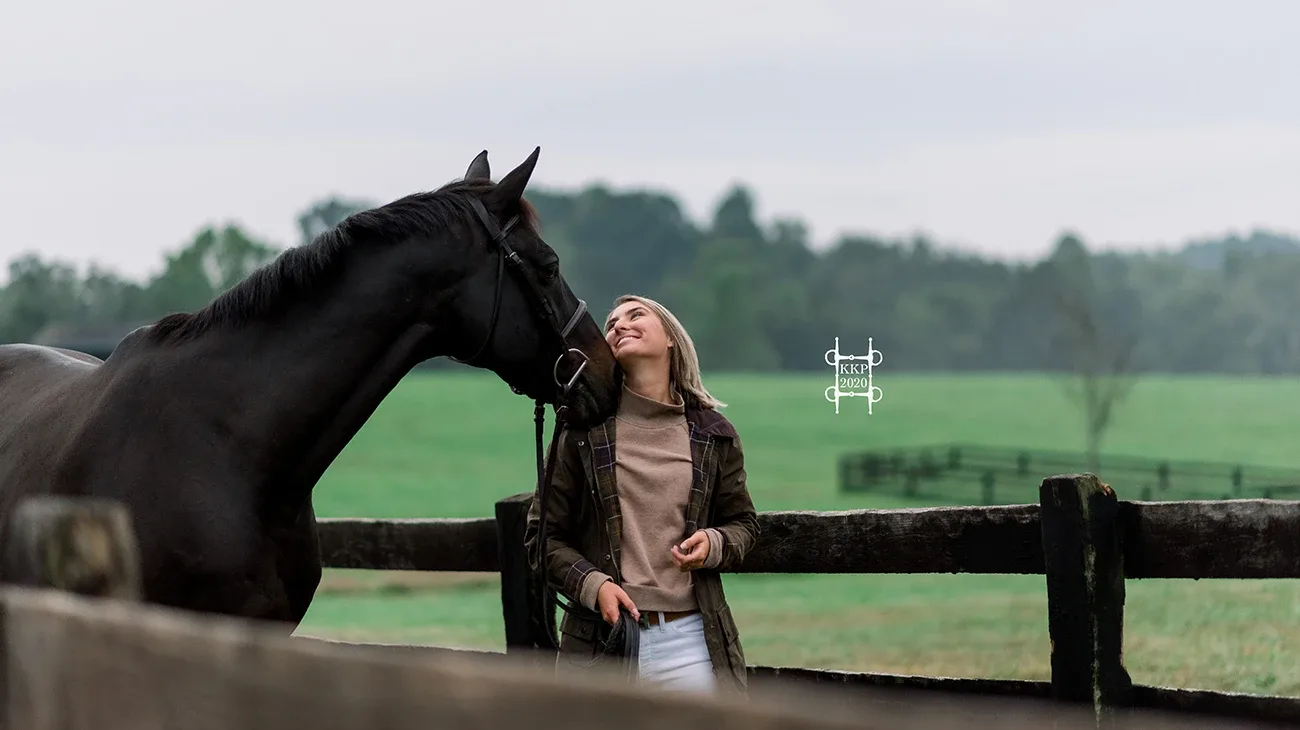Zoe Lewczak was 15 years old when she realized the power she had to make a positive difference.
As a teenager, she embarked on her first foray into community activism and successfully helped campaign to ban tobacco products from school properties in her home state of Virginia.
“I didn’t feel like I was just being a student or riding horses,” she said. “I felt like I had a call to do something more.”
Lewczak, a winner of the 2025 USHJA Hamel Family Scholarship for Further Education, has a “passion for human flourishing.” Now 25 and a master’s student at Harvard Medical School (Massachusetts) studying bioethics, she is directing that passion toward her goal of become a physician ethicist while she also works for the National Institutes of Health’s Researching COVID to Enhance Recovery (“RECOVER”) Initiative, run by the NYU Grossman School of Medicine, which researches the effects of long COVID-19.
Horses have taken a bit of a backseat temporarily while the Nokesville, Virginia, native works toward both M.D. and Ph.D. degrees, but Lewczak has a lifetime in the saddle behind her, and says her relationships with horses have influenced her career choice.

A rider since age 5, she has bounced between the hunter and jumper disciplines, even trying her hand at dressage during her college years. While attending the University of Virginia, Lewczak served as the captain of the school’s Intercollegiate Horse Show Association equestrian team.
“I don’t think that a lot of people get to have that feeling of camaraderie, but then also just being around a sport that you love,” she said of her collegiate team experience.
Her team spirit reflects her deep care for the people and animals around her. Since she was in high school, Lewczak has involved herself in work to better her communities.
ADVERTISEMENT
At 15, she joined the Virginia Foundation for Healthy Youth’s campaign to ban tobacco products from school properties throughout the state. She worked hands-on with state lawmakers, eventually seeing her efforts come together when the state passed legislation in 2019 to ban tobacco and nicotine vaping products on school grounds.
When the COVID-19 pandemic hit, she and a group of friends from the University of Virginia’s equestrian team sewed 3,000 masks to donate to frontline workers. The mask-making effort was hosted by Jill Grant, who owns a company that helps nonprofit organizations develop fundraising programs. Grant, a fellow “horse girl,” met Lewczak while searching for an intern and quickly hired her.
“Zoe is just one of those people—you could just give her an idea of something, and she’ll come back to you with a plan,” Grant said. “She’s just an easy, get-it-done person, but she’s so delightful.”
Grant wrote a letter of recommendation for Lewczak’s Hamel Family Foundation scholarship, which provides USHJA-registered student riders with $25,000 to pursue their higher education goals. Lauren Mauldin, 39, of Austin, Texas, also won the award.
“I was always really impressed with [Lewczak’s] ability to manage a full caseload of school, being captain of the equestrian team, and then being able to work with me,” Grant said. “She made it look easy, and I know it’s not easy.”
For the personal essay component of her application, Lewczak turned to her childhood, choosing to write about her small pony.
“I wrote about my small pony and how I think she taught me a lot about being—I don’t want to sound cliché—but being an empathetic and good human,” she said. When the pony was injured and unable to compete, the experience helped Lewczak learn how to aid and care for other beings.
“Being a 12-year-old and learning how to actually care for another thing was really cool for me,” she said. “I think she taught me a lot of things that have now led me to where I am today. I think being in the horse world really, really helps me in that aspect.”
ADVERTISEMENT
The importance of respect and learning how to communicate non-verbally, two skills she picked up through her equestrian career, apply to working with people as well, she said. She compared the skill of communicating with horses to communicating with patients who are unable to speak. The goal is to understand a patient’s wishes in order to best support them.
In her studies, Lewczak has focused on bioethics and aging. She is a proponent of inter-generational living, which aims to bring communities closer together through supporting their aging residents.
“My goal is that all generations can work together to help each other,” she explained. She spoke to the altruism involved in multi-generational lifestyles, where one may not receive financial compensation for helping an older neighbor, but could learn a recipe or receive “words of wisdom.”
Lewczak referenced a study in Germany in which researchers found that members of an “intentional” inter-generational neighborhood better supported each other and experienced less social isolation across all age groups. Lewczak looks towards a future where neighbors work together, and housing associations better support their residents.
Lewczak’s dream is to sit on a Presidential Bioethics Commission, the last of which operated in the United States in 2016.
She wants to be a physician “that people can engage with and actually trust,” and thanked USHJA and the Hamel family for their scholarship help in helping her achieve her overarching mission:
“Human flourishing,” she said, “is always my goal.”














